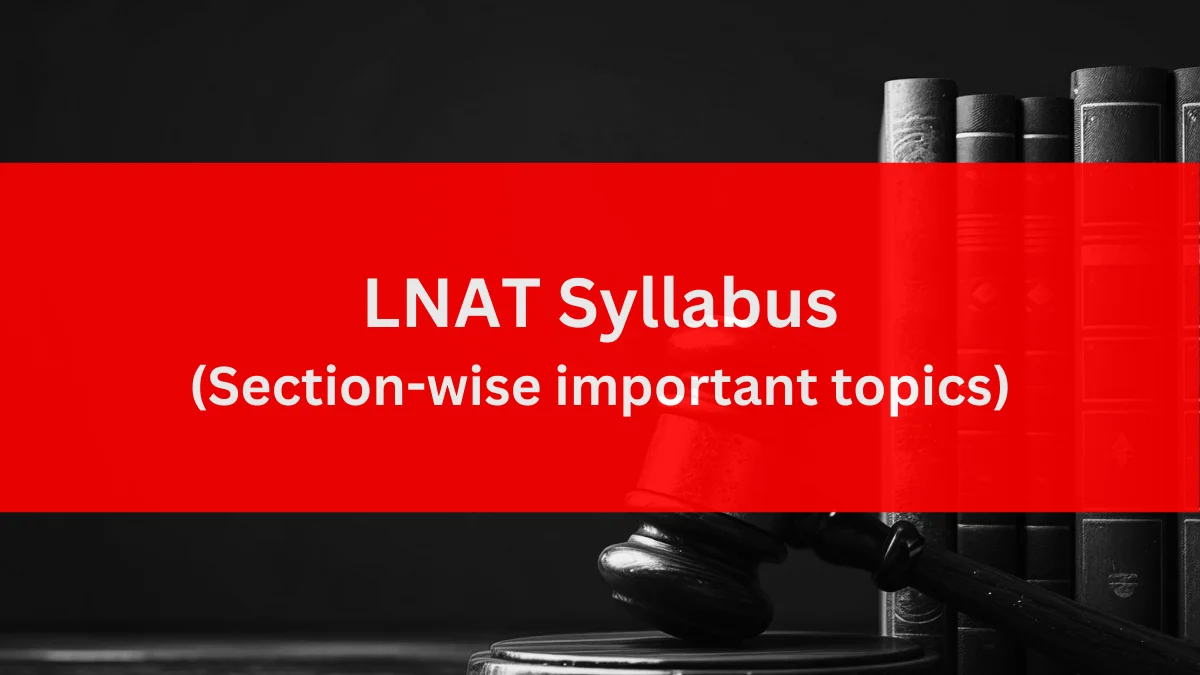LNAT syllabus 2025 – Section-Wise Important Topics
LNAT syllabus 2025 tests the candidate’s aptitude and skills to pursue a law programme. The LNAT 2025 syllabus consists of objective and descriptive essay sections. These sections will test the legal reasoning skills of candidates. Read on to get all the details about the LNAT 2025 syllabus, including patterns and tips!

LNAT Syllabus 2025: Complete Breakdown
LNAT syllabus consists of two sections- objective and descriptive. Candidates get a total of 2 hours 15 minutes to attempt both the sections:
LNAT Syllabus Section A: Multiple Choice Questions (MCQs)
This section tests your reading comprehension, critical thinking, and logical reasoning abilities through 42 multiple-choice questions based on 12 argumentative passages. Details on this section for the LNAT exam syllabus 2025 are:
Reading Comprehension
The passages in this section will be drawn from a wide range of fields, including:
- Literature: Understanding themes, character motives as well as structure.
- Politics: Evaluating arguments on policy decisions, governance, etc.
- Science: Analyzing data-driven conclusions, scientific methods, and concepts.
- History: Assessing historical events and their interpretations and historical narratives.
- Philosophy: Dealing with complex ideas and theories.
- Current Affairs: Understanding issues in society, economics, etc.
Preparation tip: Practice reading challenging texts to enhance your ability to extract meaning quickly.
Critical Thinking
- Argument Identification: You will need to identify the main argument or thesis of each passage.
- Assumptions and Conclusions: Learn to identify the assumptions, underline the arguments presented in the passage, and understand how conclusions are drawn.
- Facts vs Opinions: Distinguishing between facts and opinions is essential to evaluate the overall argument.
- Evaluation of Argument Strength: Practice assessing the evidence’s validity, strength, relevance, and reasoning.
Logical Reasoning
- Reasoning Skills: These questions often require you to analyse relationships, detect contradictions, or spot flaws.
- Inference: You will need to make inferences based on the text.
Preparation Tip: Solve the practice questions that ask you to identify logical flaws or make inferences based on textual clues.
Skills Tested
| Skill | Description |
| Interpretation | Ability to understand and interpret the meaning of words, phrases, and sentences within the passage’s context. |
| Analysis | Breaking down the structure of arguments, understanding how premises support conclusions, and identifying key elements of reasoning. |
| Evaluation | Critically assessing whether the arguments are logically sound, evaluating the evidence provided, and determining if conclusions are well-supported. |
LNAT Syllabus Section B: Essay Writing
In this section, you will be given 40 minutes to write an essay on one of the three broad topics. This test will assess your ability to construct a coherent, reasoned, and persuasive argument in written form. Here are some important details:
Essay Topics:
Essay questions are generally broad and often focus on social issues, ethical dilemmas, philosophical questions, or current affairs.
Example topics are:
- Freedom of Speech: Should freedom of speech be absolute, or should there be a limit?
- Breaking the law: Is it justifiable to break the law under any circumstances?
- Artificial Intelligence: What are the ethical implications of artificial intelligence, and how might society regulate its use?
- Social Issues: Could climate change be stopped, and who should bear responsibility for it?
Essay Writing Skills
| Skill | Description |
| Argument Construction | – Present a clear position (agree/disagree) on the topic.
– Develop a well-reasoned argument with supporting evidence and examples. – Address multiple aspects of the issue for in-depth analysis. |
| Clarity and Coherence | – Ensure the essay is well-structured (introduction, body paragraphs, conclusion).
– Ensure logical flow of ideas using transition words/phrases to guide the reader. |
| Critical Analysis | – Evaluate different perspectives on the issue.
– Acknowledge and address potential counterarguments. – Engage with the complexities of the issue rather than oversimplifying it. |
| Language and Style | – Use clear, concise language and precise terminology.
– Avoid overly complex vocabulary unless it enhances clarity and depth. – Focus on effective communication, ensuring the reader can easily follow your reasoning. |
Essay Preparation Tips:
- Practice writing essays on various topics to help you develop your argumentation and critical analysis skills.
- Work on structuring your essays with an introduction, body paragraphs that address key points, and a conclusion that ties everything together.
- During practice, pay more attention to word limits and time constraints to improve your ability to write concisely and within the time limit.
Overall Skills Tested in LNAT 2025 Syllabus
The LNAT syllabus 2025 is designed to assess the essential skills required to succeed in law studies:
- Critical Thinking: Evaluating arguments critically is essential for LNAT Syllabus 2025.
- Reading Comprehension: Candidates must be able to analyse and interpret complex texts, assessing their content and structure.
- Essay Writing: This section will test your ability to demonstrate logical reasoning, thought clarity, and critical engagement with various ideas.
LNAT Syllabus 2025 – Exam Pattern Overview
The LNAT is 2 hours 15 minutes and is divided into two sections:
| Section | Description | Time Limit | Key Notes |
| Section A | 42 multiple-choice questions based on 12 argumentative passages | 95 minutes | You can review answers during the section but cannot return after starting Section B. |
| Section B | One essay question on a range of subjects to test argumentative skills | 40 minutes | Must demonstrate a strong command of written English; click on question number to review/edit your essay. |
Preparation Strategy for LNAT 2025 Syllabus
To effectively prepare for the LNAT exam syllabus, focus on the following strategies:
- Practice Reading: Read articles, essays, and opinion pieces from diverse sources regularly. They will help improve your understanding of content and the structure of arguments.
- Solve LNAT Practice Papers: Familiarize yourself with the format of both sections in the LNAT 2025 syllabus to ensure you know what to expect on exam day.
- Develop Essay Skills: Write essays on various topics to enhance your ability to create well-reasoned, structured arguments.
- Focus on logical thinking: Engage in puzzles, critical reasoning exercises, or games to strengthen your logical reasoning and analytical skills.
With a clear understanding of the syllabus of LNAT 2025, emphasising reading, reasoning, and essay writing, you will be well-prepared to tackle the exam!
Sample Essay Topics for LNAT Syllabus 2025
Given below are some sample topics for the descriptive section of the LNAT exam syllabus:
- Does it matter if some animals and plants die out?
- “We must be prepared to sacrifice traditional liberties to defeat terrorism” Discuss.
- Should the law require people to vote in general elections?
- What is “political correctness,” and why does it matter?
- How should judges be appointed?
- Build a case for public funding of arts and culture.
LNAT Exam 2025 – An Overview
The LNAT, in its complete form, is the National Admission Test for Law. The exam serves two essential purposes: one, it helps students determine whether they are the right fit for a legal career, and two, it assists universities in deciding whether students will succeed in law courses. While the exam is primarily designed to assess students looking to study law in the UK, many Indian law colleges have also begun accepting LNAT scores. Jindal Global Law School, part of OP Jindal Global University, accepts LNAT scores for admission.
LNAT is a computer-based examination generally taken by those aspiring to study a bachelor’s programme in law. It is administered by Pearson VUE under contract with the exam. The test content is managed by LNAT Consortium members, which consists of six universities.
Why Take the LNAT Exam?
LNAT is an integral part of undergraduate law admissions and also helps admission officers evaluate students apart from other subjective parts of the application process. Reasons why law aspirants who want to study in the UK should choose to take the exam are:
- It is a singular test designed especially for law and is used by LNAT universities to provide single-degree or joint LLB degrees.
- It is a fair and just way to compare students of equal academic merit.
- The exam also reduces the university’s dependency on grades to determine the candidature of applicants.
- The test also checks the potential of candidates rather than their achievements.
- LNAT also helps to check the English proficiency of international students without requiring them to take additional English language proficiency tests.
The LNAT 2025 exam will mark the first time an Indian law college, OP Jindal, will accept its scores. The exam is expected to rise in popularity as more Indian schools begin to admit students based on LNAT scores. For now, students looking to pursue law in the UK should understand the whole syllabus and craft their preparation strategy accordingly.




